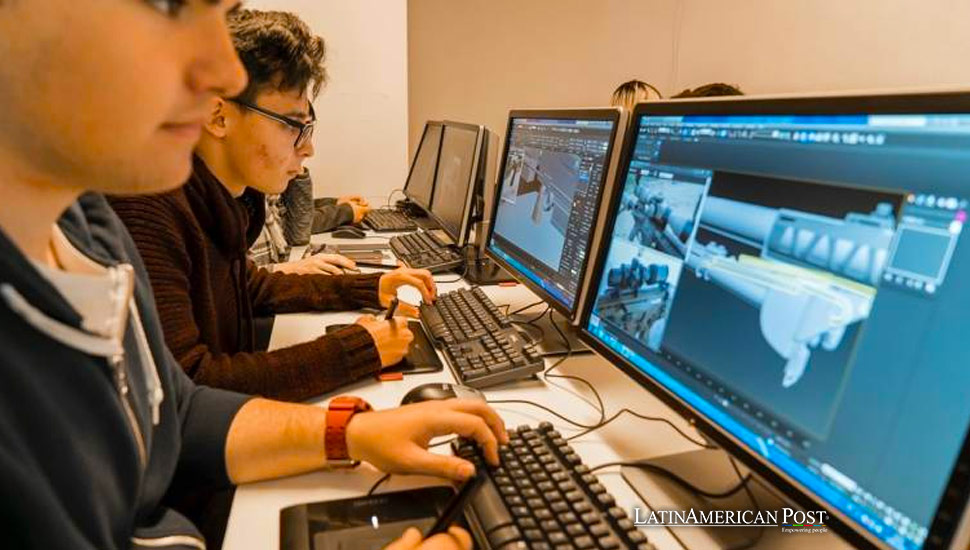Venezuela launches game development course to boost tech education

The Venezuelan Ministry of Science and Technology is launching a game development course to promote scientific and technological education. The program aims to equip participants with essential video game design and programming skills, reflecting the government’s commitment to technological advancement.
The Venezuelan Ministry of Science and Technology announced this Sunday that it will organize a course aimed at individuals interested in video game development to promote “scientific and technological education” in the country.
The ministry stated in a press release that the course is designed for individuals with essential knowledge and a personal interest in entertainment technology development. “Participants will learn the basic design process: breaking down their ideas into mechanics, understanding their implications, iterating, and sharing,” the statement added.
The course aims to provide a broad understanding of the medium, allowing participants to apply what they learn during the sessions, which will be held from Sunday through the following Thursday in Caracas.
Course Curriculum and Objectives
The ministry emphasized that the course will cover the principles governing the design and development of video games, including an introduction to the ‘Godot’ game engine and the basics of programming in ‘GDScript.’ This comprehensive curriculum is intended to equip participants with the foundational skills needed to embark on their journey in game development.
Gabriela Jiménez, the Minister of Science and Technology, highlighted the importance of such initiatives in fostering technological advancement in Venezuela. “By providing these educational opportunities, we aim to empower our citizens with the skills needed to thrive in the digital age,” she said.
Broader Educational Initiatives
This game development course is part of the Venezuelan government’s broader strategy to enhance technological education and skills among its population. On June 10, the government launched a training program in educational robotics for members of the Bolivarian National Armed Forces (FANB). This initiative, as announced by Minister Jiménez, aims to consolidate national technological development and provide effective solutions for the demands of the digital era.
“We have begun training our Bolivarian National Armed Forces in educational robotics to strengthen national technological development and seek effective solutions for the demands of this new digital age,” Jiménez stated on her social media accounts.
Promoting game development and educational robotics reflects the Venezuelan government’s strategic focus on integrating advanced technological skills into the national education system. By targeting civilians and military personnel, the government seeks to build a robust technological foundation to support various sectors, including entertainment, defense, and general industry.
The emphasis on game development is particularly notable as it taps into a rapidly growing global industry. Video games represent a significant entertainment market segment, offering numerous opportunities for economic growth, innovation, and job creation. By equipping its citizens with the skills to develop video games, Venezuela aims to position itself as a player in this lucrative industry.
Implementation and Expected Outcomes
The game development course in Caracas is expected to attract diverse participants eager to explore the world of video game design and programming. The hands-on approach, utilizing tools like the Godot game engine, ensures that participants gain practical experience that can be directly applied to real-world projects.
The ministry anticipates that this course will be the first of many initiatives to nurture technological talent in the country. Future courses may cover more advanced topics in game development, programming languages, and other areas of digital technology.
While the initiative is promising, it faces several challenges. Venezuela’s economic situation and limited access to advanced technological infrastructure could hinder the program’s effectiveness. However, the government’s commitment to investing in educational resources and training programs represents a critical step towards overcoming these barriers.
The potential benefits of these educational initiatives are significant. By fostering a culture of innovation and technical expertise, Venezuela can leverage its human capital to drive economic development and improve its global competitiveness. Additionally, providing citizens with skills in emerging technologies can open up new career opportunities and enhance their quality of life.
A Path to Technological Empowerment
The Venezuelan Ministry of Science and Technology’s efforts to promote game development education are a testament to the country’s commitment to advancing technological literacy. Through courses like the one in Caracas, Venezuela is laying the groundwork for a more technologically adept population capable of contributing to various high-tech industries.
As these initiatives take root, they promise to transform Venezuela into a hub of technological innovation, foster economic growth, and improve the lives of its citizens. The focus on both civilian and military education in cutting-edge fields underscores the comprehensive approach the government is taking to build a resilient and forward-looking nation.
Also read: Venezuela Boosts Public Sector Bonuses Amid Economic Strains
The success of these programs will depend on sustained investment, international collaboration, and the ability to adapt to rapidly changing technological landscapes. If these elements align, Venezuela could emerge as a leader in the digital age, leveraging its human capital to achieve lasting progress and development.




